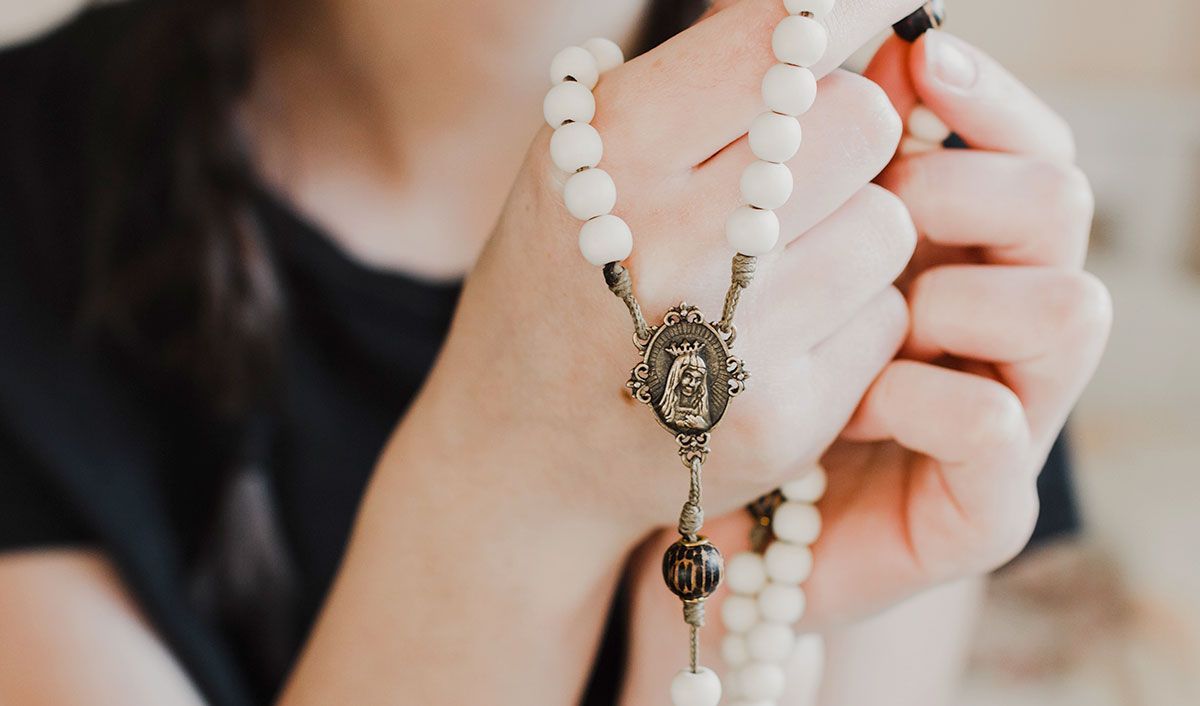The Power of Prayer: The Rosary

Dios te salve, María,
Llena eres de gracia,
El Señor es contigo,
Bendita tú eres entre todas las mujeres,
Y bendito es el fruto de tu vientre, Jesús.
Santa María, Madre de Dios,
Ruega por nosotros, pecadores,
Ahora y en la hora de nuestra muerte.
Amén.
There is nothing more painful than losing someone you love dearly. Although we draw comfort from our family and friends during loss, praying the Rosary can also bring much consolation and continues to be one of the most significant traditions in times of difficulty for many Latino families.
What is the origin of praying the Rosary?
The very beginnings of the Rosary is unknown. We do know that the word ‘rosario’ comes from the Latin rosarius, which means “bouquet of flowers,” or a bouquet of prayers offered to God. The word bead is an Old English term that originally meant “a prayer.” The use of beads as an aid in prayer has a long history both in the Catholic Church and other religions.
The Rosary gained widespread popularity in Europe in the late 12th to early 13th centuries, when Saint Dominic encouraged Christians to use it as a remedy to heresy and absolution from sin. Today, it is the most widespread prayer among Hispanic Catholics when a loved one has died, prayed while holding rosary beads in hand.
¿Qué es el rosario?
El Rosario is a Roman Catholic devotion made up of a series of prayers that help worshippers meditate on five sacred mysteries. Each mystery begins with a Padre Nuestro, then ten Ave Marias, and ends with one Gloria. A series is called a decade, so called because of the ten Ave Marias. When the Rosary is recited, worshippers reflect upon each mystery, stories from the lives of Mary and Jesus.
The chain of beads helps us keep a pace for the prayers, and the repetition provides a background for meditation. The rhythm of the prayer can help a person quiet their mind and soothe their soul during their prayer. It is thought of as an intimate spiritual conversation with the Virgin Mary.
¿Por qué rezamos el Rosario en los funerales?
The Holy Rosary is an enormous source of grace and spiritual protection, and one of the most powerful sacramentals of the Catholic Church. Traditionally, we pray el Rosario at a funeral service to ask for the Virgin Mary's intervention with God so that our beloved deceased may find eternal rest with the Lord.
The repetition in the Rosary is meant to lead mourners into peaceful and thoughtful prayer and helps them enter the silence of their hearts, where Christ's spirit dwells. These prayers bring solace and comfort to the family of the deceased, knowing that they are helping their loved one enter Heaven.
Qué esperar en el servicio del rosario
A rosary service is a part of funeral rites that take place in the Catholic tradition. Traditionally, the Rosary takes place during the velorio or viewing, and usually held on the evening prior to the burial.
The Rosary can be said privately or with a group. The family will use this time to pray and receive visitors. The recitation of the Rosary, which lasts about twenty minutes, may be led by a family member or by a priest.
Traditionally, an elder female member of the family would lead the prayers. The family and friends of the deceased can follow along with the prayer or sit quietly as the Rosary is being said.
Rosary services are generally open to anyone who wishes to attend. Non-Catholics in attendance can sit and listen quietly or join in.
Junto en ruego
Whether you know each prayer by heart or need help following along, being present and close to your loved ones can give those grieving immense comfort and support. Understanding El Poder Milagroso del Rosario is a wonderful way of connecting the younger members of the family with older generations. La familia and tradition are great strengths of the Latino people. Praying the Rosary together is a powerful way to unite a community in grief.
Go en paz.
As members of Denver’s Hispanic communities, we feel a deep responsibility to help its families through some of their most difficult days. We are here for you and your loved ones, and our staff is available to answer any questions you may have.
Llámanos al (303) 996-0701.
365 DAYS OF GRIEF SUPPORT
Sign up for one year of grief messages designed to offer hope and healing during difficult first year after a loss
Please wait
Verifying your email address
Please wait
Unsubscribing your email address
You have been unsubscribed
You will no longer receive messages from our email mailing list.
You have been subscribed
Your email address has successfully been added to our mailing list.
Something went wrong
There was an error verifying your email address. Please try again later, or re-subscribe.
Translate This Website:

